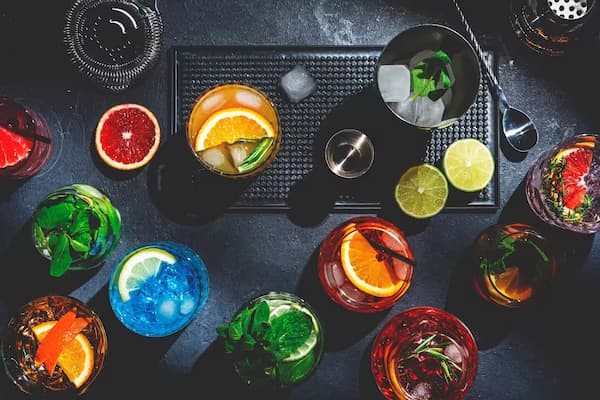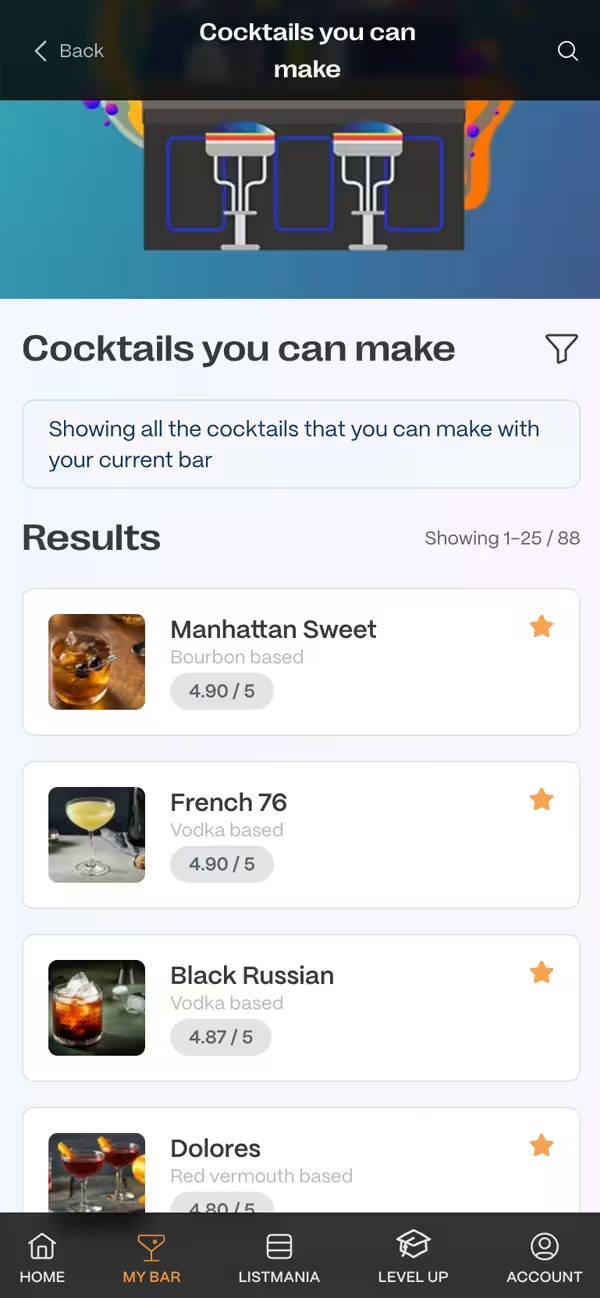Cola
With Cola you can make
Unexpectedly Potent and Refreshing
Long Island Iced Tea
White rum, Gin, Tequila blanco, Vodka, Cointreau, Cola, Lemon juice, Sugar / simple syrup
South America's fizzy classic delight
Piscola
Pisco, Aromatic bitters, Cola
Classic, Refreshing, Unforgettable
Cuba Libre
White rum, Lime juice, Cola
A taste of bold adventure.
Gold Rush
Cinnamon shcnapps, Bourbon, Jagermeister, Cola
Bold flavors and sweet nuttiness unite.
Jack's Godfather Highball
Whiskey, Amaretto, Cola
Serve Up a Winning Sip!
The Tennis Cup
Gin, Triple sec, Dubonnet, Aromatic bitters, Ginger ale, Cola, Orange
The Clarky
Dark rum, Coffee liqueur, Coffee liqueur, Cola, Grenadine
A smooth secret to savor
The BEMCo
Vodka, Lime juice, Cola, Sugar / simple syrup
Classic simplicity in every sip
Whisky and coke
Whiskey, Cola
A sip of golden triumph.
Golden Smash
White rum, Apple liqueur, Cola, Sugar / simple syrup, Lemon, Water, Basil leaves
We've got 10 cocktails that can be made with Cola.
Find out what to make with Cola
Q&A
What is the history and origin of cola as a cocktail ingredient?
Cola originally gained popularity as a soft drink in the late 19th century, with brands like Coca-Cola emerging in the 1880s. Initially marketed for its medicinal qualities, cola quickly became a beloved beverage worldwide. In the realm of cocktails, cola's incorporation can be traced back to the early 20th century, gaining notoriety with the creation of the Cuba Libre around the 1900s, which combines rum, cola, and lime. Its role in cocktails stems from its unique balance of sweetness, acidity, and effervescence, making it an integral mixer in various alcoholic concoctions. The global popularity and accessibility of cola have solidified its place in mixology history.
What are suitable substitutions for cola in cocktails?
If cola is not available, or you're seeking a different flavor profile, several alternatives can be used. Ginger ale or root beer offers a similarly sweet yet spicy flavor, while club soda or sparkling water mixed with a splash of simple syrup and citrus juice can mimic cola's effervescence and sweetness. For a caffeine-free alternative, consider using caffeine-free cola varieties or a dark herbal tea sweetened and chilled. These substitutions can provide a unique twist on classic cola-based cocktails while maintaining the desired balance of sweetness and fizz.
How should cola be stored and prepared for use in cocktails to maintain its quality?
To preserve the quality of cola for cocktails, it's crucial to store it properly. Keep unopened cola in a cool, dark place away from direct sunlight to prevent changes in flavor and carbonation. Once opened, store cola in the refrigerator and tightly seal it to maintain its effervescence. For cocktails, chilled cola is preferred to avoid diluting the drink with excessive ice, which can diminish the beverage's overall flavor and carbonation. Pouring cola gently into the drink can also help retain its fizz, enhancing the cocktail's texture and taste.
What are some classic and innovative ways to serve cola in cocktails?
Cola is versatile, serving as both a classic mixer in drinks like the Rum and Cola or Whiskey Cola, and as a base for innovative concoctions. For a classic touch, try the Cuba Libre, which adds lime to the mix, or the Long Island Iced Tea, where cola adds sweetness and color. For something innovative, experiment with cola in tiki cocktails for a pop of sweetness or craft homemade cola syrups for a more artisanal approach. Mixing cola with different flavored liqueurs or infusing it with herbs and spices can also create unique, refreshing beverages suitable for any occasion.
How can cola be used in non-alcoholic cocktails for a similar depth of flavor?
Cola's complex flavor makes it an excellent base for non-alcoholic cocktails, providing a satisfying depth that mimics alcoholic versions. A Virgin Cuba Libre combines cola, lime, and ice for a simple yet refreshing drink. Experimenting with homemade cola syrups, incorporating natural spices and flavorings, can elevate the taste of non-alcoholic mixed drinks. Additionally, mixing cola with fruit juices, herbal teas, or tonic water can create sophisticated, adult-friendly beverages that offer complexity and nuance without the alcohol.
Ingredients like Cola
Other Soft Drinks
How it works
Easily create your bar from the ingredients you have at home, and we'll show you what you can make with the ingredients you have to hand.
Once you've added this ingredient head to your My bar page and fill up everything else you have.
We'll also show you cocktails that can make by substituting what you have for one of the ingredients you don't, riffing on the original. Now go forth and create something delicious!





















